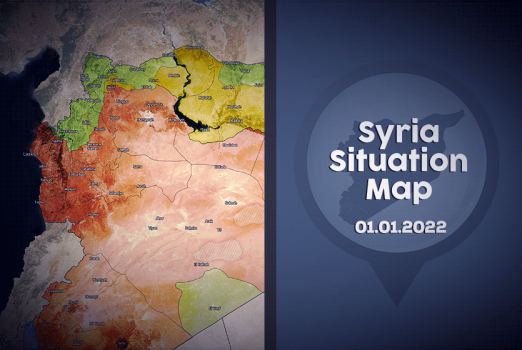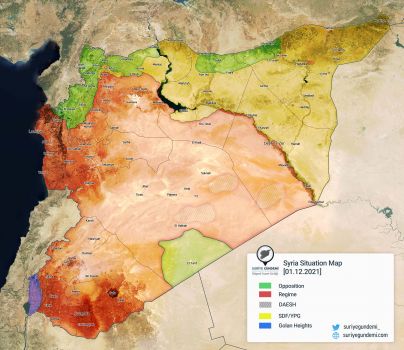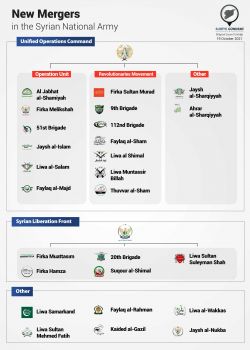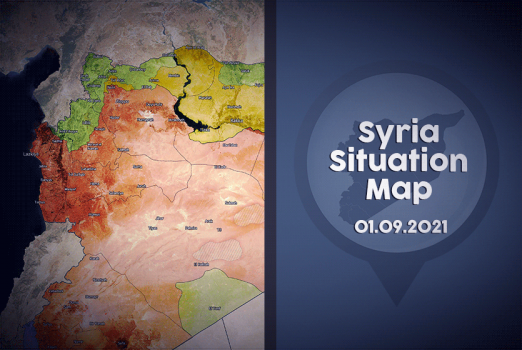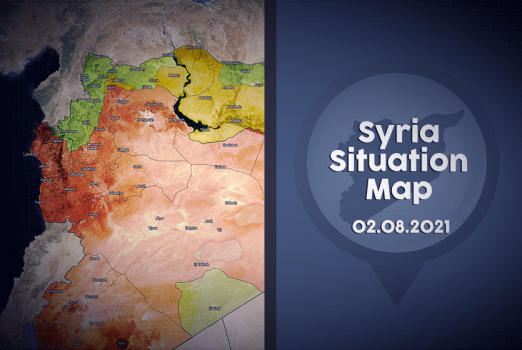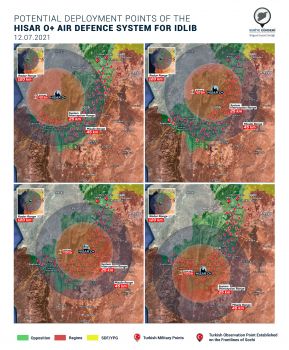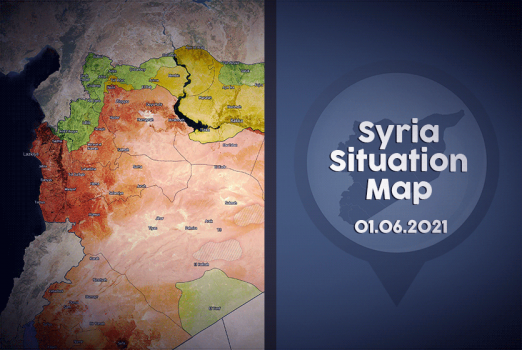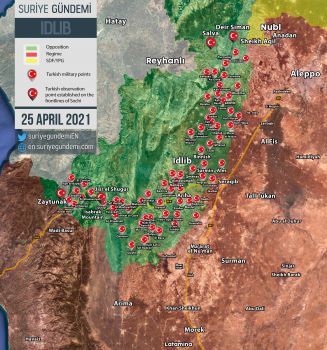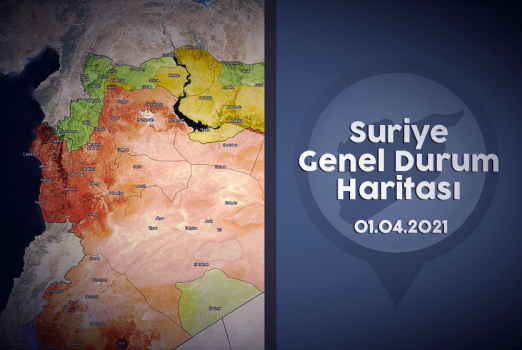The Strategic Importance of Sinjar in the Fight Against the PKK/PYD
While Turkey has cleansed Afrin from terrorist elements with the Operation Olive Branch and continues its fight against the PKK’s extensions in the north of Syria, it continues to fight against the PKK’s extensions in northern Iraq and Sinjar especially. Turkey has, with the words of its president Erdoğan, made clear that it will not tolerate any PKK presence in Sinjar as Sinjar is seen as a priority target in its fight against the PKK in northern Iraq. This is due to Sinjar being the main connection in the PKK’s terrorist lengthy Iraq-Syria corridor. The Fishabur border crossing on the Iraqi-Syrian border with its proximity and connection to Sinjar is especially seen as a logistics and supply hub between Qandil and the Syrian cantons.
The terrorist organization has, as in Syria, taken advantage of the possibilities it was offered by the terrorist organization of Daesh, and gained ground in Sinjar. The terrorist Daesh had entered Sinjar in 2014, while the KDP peshmerga withdrew from Sinjar to Zummar. The PKK has with the help of the US taken advantage of the fragile situation in terms of security and settled in Sinjar. To make its existence in Sinjar permanent, the PKK has chosen to organize the regional Yezidi population along its own ideological lines. While it has tried to clinch its political and civil presence in Sinjar with the Shengal Founders Council, the Women’s Freedom Movement and the Martyrs Afrin Academy, it has constructed and settled communication centers, ammunition depots and command centers on the Sinjar mountain. When we consider the Mahmur camp of the PKK that lies in between Qandil and Sinjar, we can see that the PKK is trying to establish a line of control that carries the potential to exploit the people of northern Iraq and force them into the inner parts of Syria.
The presence of the PKK is not only disturbing Turkey but also the Kurdish Regional Government as the KDP-backed Rojova peshmerga carried out a military operation on Sinjar which was welcomed by Turkey in March 2017. However, the US has internalized a strategy that incorporates supporting the PKK and its extensions and thus pressured the KDP into conceding in favor of the PKK as the US used the excuse that it was “harming the fight against Daesh”. Additionally, the central government of Iraq chose to support and pay the salaries of Sinjar’s Yazidis, who have connections with the PKK, to try to balance the KRG’s influence in the region. Moreover, the Gorran movement and PUK, which are in opposition to the KDP in the KRG, have internalized a rhetoric that favors the PKK in the tensions between the KDP and the PKK.
With the Euphrates Shield Operation, Turkey has made clear it is acting according to a new strategy it adopted in its fight against terrorism. As Turkey saw that its desired outcome was not realized in the fight between the Rojova peshmerga and the PKK, Turkey chose to conduct airstrikes against the PKK’s presence in Sinjar-Karachok. Turkey’s actions have shown that it will make game-changing moves in the region in line with its own national security and regional stability and that it will be an effective player that creates new realities on the ground that other players will need to accept.
Preventive Intervention against Terror
In Syria and Iraq especially, as in the Middle East the security sector becomes more and more hybrid, the lines between state and non-state actors are becoming more and more obscure and terrorist organizations are gaining ground, Turkey has internalized a security strategy that is centered around preventive intervention. In light of this, Turkey executes military operations against sources of terrorism in northern Syria and Iraq. Its tactical moves in the forms of military operations and incursions that are interconnected and successive in order are elements of the execution of a grand strategy. The “preventive intervention” strategy of Turkey includes the Euphrates Shield Operation (ESO), the airstrikes in Sinjar and Karachok in April 2017, rural operations against the PKK within the borders of Turkey, the Operation Olive Branch, the hints at an upcoming operation targeting Sinjar and the airstrikes against the terror camps of Zap, Havasin and Hamere to the north of Qandil, in northeastern Iraq. Turkey has shown it is not refraining from using the principle of the right of self defence in a new engagement rhetoric as an answer to cross-border threats.
Turkey executes fast tactical moves along the framework of its strategy that internalizes our country’s and the regions stability in its multidimensional and local, regional and global fight against terrorist organizations like Daesh and the PKK. Turkey has destroyed terrorism at its source with the Euphrates Shield Operation against the terrorist Daesh in between August 2016 and March 2017. After the success of the Euphrates Shield Operation, the TAF on the 25th of April conducted airstrikes against terrorists on the Sinjar Mountain in northern Iraq and Karachok in northern Syria, hitting 20 targets with the aim of breaking the Syrian-Iraqi connection of the PKK. With the same objectives in mind Turkey has crushed PKK elements in its rural countryside and broken the terror corridor of Karachok-Malikiyah-Cizre and Nusaybin that extended into Turkey itself. Hence, Turkey has tackled the PKK’s terror corridor in Syria, the horizontal Iraqi-Syrian terror corridor, the vertical terror corridor of Iraq-Syria-Turkey and terrorist extensions in Turkey itself, targeting them individually but as a result as a whole too.
With the Operation Olive Branch, Afrin has been cleansed from PKK elements. The operation is certain to have implications for the PKK’s presence in Iraq. Turkey has signaled for an operation targeting Sinjar but at the same time conducts airstrikes against the PKK’s camps of Zap, Havasin and Hamere in northeastern Iraq. In other words, Turkey has dealt a major blow to the PKK’s western Syrian part of its terror corridor with the Operation Olive Branch as the PKK tries to construct a terror corridor along Turkey’s southern borders. With the Sinjar operation the aim is to prevent the fluidity of terror between Iraq and Syria. At the same time, by targeting the terrorist camps in northeastern Iraq, the aim is to incapacitate the PKK’s ease of operations and limit them to Qandil.
Intervention into Sinjar and Conjunctural Possibilities
With the Operation Olive Branch, Afrin is cleansed from PKK elements and the local and regional balances are tipped in Turkey’s favor; this has led to the US making concessions regarding the PKK. Turkey, by keeping the question of Sinjar on the political agenda, has shown it will not refrain from repeating its resolve in the fight against terror in northern Syria also in northern Iraq. When we look at Turkey’s insistent behavior in relation to the balances of power in Iraq, we see that cleansing Sinjar from terror is now more possible than it was back in 2017. With the rapprochement between Ankara and Baghdad triggered by the independence referendum in the KRG, Baghdad is now warmer to Turkey’s interests in Sinjar. However, we need to wait for the outcome of the national elections in Iraq on the 12th of May to foresee how any strategy on cooperation in the fight against terror will take shape. The dispatching of troops to Sinjar by the Baghdad government may be read as determination in counter terrorism in Sinjar. The US has seen Turkey’s resolve in counter terrorism in Afrin and has been forced to take a step back, against the PKK’s interests. This is why it will take a softer stance regarding Sinjar compared to the past. The KRG has gotten into a deep political, economic and diplomatic crisis after the independence referendum, which is why it will refrain from coming head to head with Turkey. When all of this is considered, by the summer, the conditions will be ripe for the Sinjar operation.
Turkey besides exerting its hard power capabilities, makes diplomatic moves accordingly to them. By making evident that the PKK in Sinjar is also a problem for Iraq, Turkey aims to get Iraq on its side as seen with Turkish officials visiting Iraq at the highest levels. Foreign Minister Çavuşoğlu visited Iraq in January 2018 and drew attention to the question of Sinjar and counterterrorism in northern Iraq. Chief of Staff Hulusi Akar visited Iraq in March 2018, where border security and counterterrorism were discussed after bilateral military ties gained momentum.
Turkey also makes clear that it understands the Baghdad government’s focus on “national sovereignty” when it comes to Turkey’s intervention into Sinjar. President Erdoğan’s words convey this clearly: “If you can take care of this, take care of it. If you cannot, we will enter Sinjar overnight and cleanse it from the PKK. If we are friends, and brothers, you will grant us the necessary ease when it comes to it.” Ankara, with this statement, conveys the message that Baghdad needs to do something about Sinjar, and Turkey will judge this accordingly to the military capabilities of the Baghdad government and that Turkey will not stand idly by if the PKK’s presence continues.







